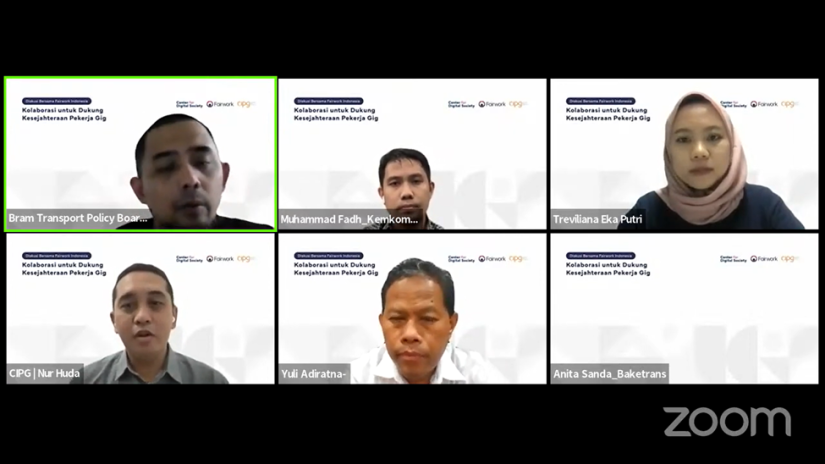
Yogyakarta, November 8th 2022—The Center for Digital Society (CfDS UGM) in collaboration with Fairwork Indonesia and the Center for Innovation Policy and Governance (CIPD) held a Group Discussion Forum (FGD) entitled “Discussion with Fairwork Indonesia: Collaboration to Support the Welfare of Gig Workers” on Tuesday (8/11). In this event, Muhammad Fadh represented Gunawan Hutagalung, Interim Director of Post, Directorate General of Post and Information Technology, Ministry of Communication and Information Technology (Kemkominfo); Yuli Adiratna, Director of Bina Riksa Labor Norms, Directorate General of Binwasnaker and K3 of the Ministry of Labor of Republic of Indonesia; and Bram Hertasning representing Gede Pasek, Head of the Transport Policy Agency.
Gig workers in Indonesia are experiencing rapid growth. Bloomberg noted that a third of the 127 million workers in Indonesia are gig workers. Along with the increasing number of gig workers, there are various impacts, opportunities, and challenges in the gig economy.
Gig workers who are contract-based freelancers provide convenience and flexibility in doing work. However, Yuli said that there were negative impacts brought about by the gig economy, including the difficulty of having a good career path, the potential for exploitation, to the lack of worker protection, and inadequate pay. Departing from these problems, Yuli explained several important things in an effort to protect gig workers. “Of course, the important thing is collaboration and synergy between ministries and agencies in protecting gig workers,” said Yuli.
Bram continued the discussion by explaining the results of a survey regarding the impact of implementing new tariffs for online motorcycle taxi drivers. Even though the rates have increased, the income of online motorcycle taxi drivers is almost the same as the operational costs incurred. This shows that the income of online motorcycle taxi drivers is still low. “Drivers also haven’t paid attention to the fatigue factor which affects safety,” said Bram.
Through the survey results, there are several points that are recommended. These recommendations include the need for attention and an active role from the operator in the driver’s welfare. In addition, the safety aspect must also be a top priority, especially with fairly high accident risk. Finally, there is a need to monitor the increase in online motorcycle taxi rates in order to balance meeting the needs of service users, drivers, and applicators.
Gig workers can also be found in the postal service sector, especially with the massive use of these services in the e-commerce sector. Fadh said that the increasingly massive use of e-commerce has brought about the phenomenon of free shipping and Cash on Delivery (COD). Both of these can provide losses for postal organizers. In addition, the use of autonomous vehicles can also disrupt tariff settings.
Therefore, the Ministry of Communication and Information has made various efforts, such as encouraging the creation of fair and transparent business agreements and preparing provisions related to delivery service standards. “The Ministry of Communication and Information also needs to consolidate regarding the implementation of tariff variations in the e-commerce era,” said Fadh.
